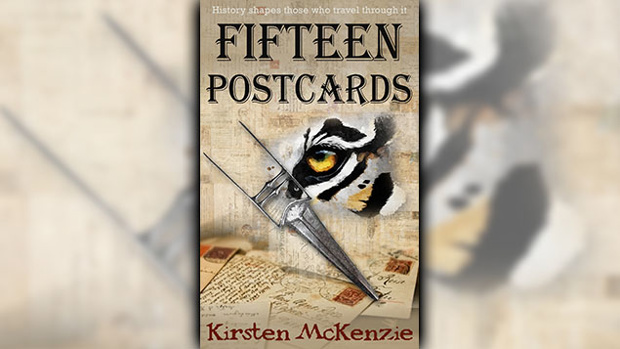Stephanie Jones: Book Review - Fifteen Postcards by Kirsten McKenzie
- Publish Date
- Thursday, 27 August 2015, 3:46PM

- Author
- By Stephanie Jones
New Zealander Kirsten McKenzie’s first novel, Fifteen Postcards, commits something of a bait-and-switch: opening in a dusty antique store in central London and showing every sign of being a young woman’s journey of self-discovery through elderly furnishings, it turns out to be a time-bending melodrama that takes in the British aristocracy of the 1800s, colonial India and gold-rush-era New Zealand.
The first giveaway that this is no ordinary story is that the store’s original proprietors and the parents of the heroine, Sarah Lester, both disappeared without trace eight years apart. Exactly what happened seems to be explained when Sarah accepts the delivery of goods from a deceased estate and, upon laying hands on a stack of postcards, is transported to the home of the aristocratic Greys two centuries earlier, and into the personhood of a kitchen maid named Betsy.
Sarah adjusts remarkably well to this turn of events, McKenzie being more interested in the myriad settings and propulsive plot than the psychological effects of unforeseen time travel, and resolves to “just be Betsy” and “shelve Sarah until she [finds] a way back home”. She does, however, spy the opportunity to track down her parents, and to bring artefacts of significant historical (and monetary) value back to the heretofore unremarkable store.
Scarcely does Sarah have time to engage Christie’s, however, before she is embroiled in her next adventure, as the wealthy Grace Williams, who dines at the Savoy Hotel and is attended to by the great chef Escoffier before being presented for marriage to . . . Edward Grey, scion of the family to which Sarah was previously in service. As is so often the case, Edward – whose union with Grace is designed to rescue the family from financial ruin – is plagued by a dissolute younger brother, Benjamin, who takes after their father, Lord Henry, in being an alcoholic and all-round reprobate (poor Betsy barely escapes his very rough handling).
In the present day, what’s more, Sarah must elude another Grey: Richard, the great-grandson of Benjamin and a cartoonish avenger of his family’s lost name who has devoted himself to retrieving the shards of its scattered fortune. Ten bucks as to whether he’s any match for our Sarah.
McKenzie’s plotting is mostly methodical and logical, but Fifteen Postcards is marred by several scenes and perhaps 100 pages too many. The passage in which she fetches up in New Zealand, a land then rife with righteous English settlers and opportunists irritated by the preponderance of “savages” and “natives”, does little more than illuminate that in most historical settings, an attractive young woman on her own will have her hands full alternately fending off lechers and offers of marriage.
Once again, in India during the Raj, where the novel’s climactic events take place, Sarah is a woman available for marriage inside the cloistered environs of Simla, the home of British Army HQ and the hub of British India. Like the interlude in New Zealand, it is revealing of the racism of the colonizers towards the indigenous people of the land in their possession.
Fifteen Postcards’ best quality is its unpredictability: from page to page, the reader can never be sure where McKenzie will go next. What is missing in narrative discipline and character expansion is made up for in storytelling flair and energy that reveals McKenzie as a writer of considerable promise. This story is one for devotees of adventurous historical fiction and tales of plucky young women finding their feet.
Take your Radio, Podcasts and Music with you

